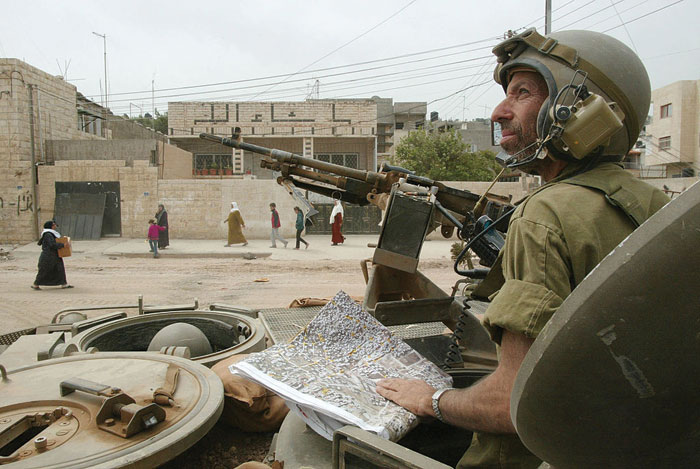 An Israeli soldier in an armored personnel carrier mans a position in the Jenin refugee camp in the northern West Bank on April 16, 2002
(Thomas Coex—Pool/Getty Images)
An Israeli soldier in an armored personnel carrier mans a position in the Jenin refugee camp in the northern West Bank on April 16, 2002
(Thomas Coex—Pool/Getty Images) When I think of the word “massacre,” I think of Francisco De Goya’s chilling 1814 painting, “El Tres de Mayo de 1808,” or “The Third of May 1808.” Goya’s composition shows a line of French soldiers, determined and stoic, aiming their guns at a gaggle of unfortunate Spanish resistance fighters, standing over an array of corpses that had already been shot. To their immediate right is a line of damned prisoners awaiting their fate. When others hear the word “massacre,” they may think of Tiananmen Square, when Chinese troops opened fire on student protestors in 1989 killing what is estimated to be thousands, or one may think of the Einsatzgruppen, the Nazi killing units that shot millions of Jewish men, women and children into mass graves to cleanse the Third Reich’s “living space.” Across political and cultural divides, the connotation of a “massacre” seems to be universal: a politically motivated and cruel killing spree that leaves a number of unarmed people dead.
Because massacres are understood to be politically motivated, the word can consequently be used to manipulate, misinform and misconstrue. No people are more aware of this than the Palestinians, who have once again labeled a recent Israeli military operation in the infamously turbulent city of Jenin as a massacre. Though the Israeli military says that the January 26th incursion into Jenin’s refugee camp was to confront terror operatives who had made clear their intention of killing Israeli civilians, and although there is a mountain of evidence to prove that these terrorists returned fire with guns and ammunition of their own, the word “massacre” is already ubiquitous in analysis of the conflict. Congresswoman Rashida Tlaib (D-Mich.) tweeted: “We honor the victims of the Jenin massacre by telling the truth about the apartheid gov’t.” Human rights attorney Noura Erakat said: “Yesterday’s assault on Jenin was a massacre … who will protect Palestinians?” And popular Palestinian journalist Mohammed El-Kurd wrote: “This morning the Israeli Occupation Forces committed a massacre in Jenin … This is what Zionism is. A death cult.”
As the saying goes, those who forget history are doomed to repeat it.
What matters is the narrative that the producers of the film and the college campuses and left-wing organizations that screen it have supported and publicized, and how this narrative brings them closer to a desired goal.
During the second intifada, a similar Palestinian campaign was launched, crystallized in the 2002 documentary: “Jenin, Jenin.” In this film, which the Israeli Supreme Court has waffled on whether to ban since its release, Palestinian residents of Jenin’s refugee camp testify that Israel barged in and slaughtered hundreds of innocent Arab civilians without context. “Jenin, Jenin” conveniently leaves out that this operation, part of the greater operation “Defensive Shield,” was in response to the largest wave of terror Israel had seen since its creation, including the murder of 30 civilians at a Passover seder in Netanya. “Jenin, Jenin” also leaves out the reports by Human Rights Watch, Amnesty International, and the United Nations (not exactly known friends of Israel), which found zero evidence of an Israeli massacre in the refugee camp. Unfortunately, none of this matters. What matters is the narrative that the producers of the film and the college campuses and left-wing organizations that screen it have supported and publicized, and how this narrative brings them closer to a desired goal.
In 2019, famed Soviet refusenik and former Israeli lawmaker Natan Sharansky said of the 2002 Jenin raid: “We sent our soldiers from house to house. 54 terrorists were killed, 23 Israelis were killed, and it stopped the second intifada. Some Israelis, including my own nephew who fought in Jenin, accuse the Israeli government of, to avoid criticism and to save the lives of Palestinians, sacrificing Israeli soldiers. And then I come to America and see this film and a young Jew says to me: ‘for me as a liberal Jew, it would be easier if Israel did not exist.’”
In Sharansky’s words, we see a blaring double standard placed against Israel and the premeditated effect of labeling both the 2002 and the 2023 Jenin raids as massacres. First, Sharansky nods to the fact that unlike that which was committed by the Germans, the Chinese and the French, the supposed “massacre” by Israeli troops was not a ruthless barrage of violence against those without the power to defend themselves, but rather a fight between two militant forces, with a number of casualties on both sides. Additionally, these militant forces were not equal in morality: One was attempting to root out the possibility of violence against civilians, while the other was trying to enact it. Second, we see that the use of the word “massacre” in association with Israel toxifies the image of the Jewish state and the image of Jews who support its existence in the public square. Although neither the French nor the German nor the Chinese nation were subjected to a campaign of delegitimization against its very existence after their respective massacres (or even genocides,) the association of the Jewish nation with this word is designed to place a question mark next to a Jewish nation living and breathing in any borders whatsoever. A liberal Jew confiding in Mr. Sharansky that he would rather Israel not exist at all after watching “Jenin, Jenin” is the ultimate sign of the anti-Zionist success.
I want to be clear: Terrible things happened in Jenin in both 2002 and 2023. In 2002, much of the refugee camp was bulldozed, property was destroyed, and in both raids, civilians were killed. I am not so naive to think Israel is an angel in the heat of battle, nor am I unsympathetic or uninterested in criticism of these specific operations. Also necessary, I believe, is a conversation on how effective the occupation of the Palestinian territories is in keeping Israel safe at all, especially after one of the bloodiest years on record in this land.
And yet there is no denying that the Palestinian insistence on the word “massacre” to describe nothing of the sort is intended not to criticize the occupation, but to delegitimize Israel’s existence in its entirety, and to invert the causes and effects of the conflict in order to curry more support. After all, it was war and terror against Israel that led to the occupation of the territories in 1967 in the first place. It was senseless bloodshed in the heart of Tel Aviv that led to the Operation Defensive Shield in 2002. And it was a terror-filled 2022 that led to the 2023 duel in Jenin. The Palestinians would rather us believe the opposite: that it was Israel who built up their troops along the borders of Arab countries with the intention of seizing more land in 1967, that the terrorists of the second intifada were motivated by settlement construction and not by the possibility of sabotaging the Camp David Summit, and that the Jenin raid was a random act of violence in which civilians and elderly women were targeted. With no end in sight to this cycle of grief and killing, it remains of paramount importance to confront lies like this and expose them each time they are presented, and to simultaneously hold the Israeli government and defense forces accountable so these lies are never given the opportunity to develop at all.
Blake Flayton is the New Media Director and Columnist for the Jewish Journal.























 More news and opinions than at a Shabbat dinner, right in your inbox.
More news and opinions than at a Shabbat dinner, right in your inbox.